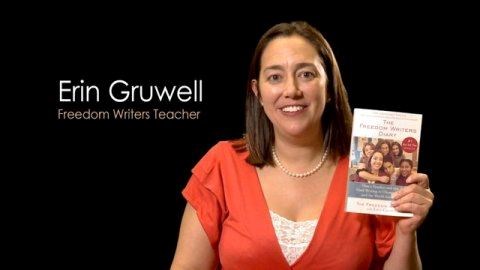 |
| (http://youarewhatyouread.scholastic.com/adults/people/show/names-you-know/erin-gruwell (Scholastic: You Are What You Read)) |
"So one day when Ms. Gruwell pointed out my 0.5 GPA, but said I had potential, I felt guilty. Then before I left class, Ms. Gruwell told me something that would change my life forever. She told me she believed in me. I have never heard those words from anyone . . . especially a teacher (Freedom Writers 46).
Every day Erin Gruwell's students would came to class feeling hopeless. They were labelled "misfits". In a moment that defined her teaching career, Gruwell confronted this challenge and openly praised a student who considered himself a failure. Gruwell's "misfits" were the students other teachers at the school deemed failures. Gruwell , on the other hand, became a motherly figure to her students, and drove them to reach their full potential. She would not permit failure. Forced into the class of the "hopeless," Gruwell was twenty-three years old when she walked in with her fancy white pearls into Woodrow Wilson High School. No one believed she would do well teaching for the first time. No one, including her fellow teachers believed in her ability to even approach her students. Gruwell even faced bitter criticism from fellow teachers. Gruwell's optimistic and peppy mood was in direct contrast to such a desolate climate in Long Beach, California. Yet, Gruwell merged her students from a wide variety of ethnic backgrounds into a family. As she began to understand her students, she bonded with them, creating a well-fortified relationship. Gruwell possessed focus, compassion, and charisma, becoming a hero of high standards. Focus is a vital tool for heroes because it gives purpose, a characteristic exhibited through Gruwell's undying passion for her students. With her small position in a small neighborhood, Gruwell found her goal to help her failing students succeed and stayed focused on steering her students towards the right directions. Compassion, a trait that allows a hero to empathize and put others' needs before their own, is also important in a hero. Gruwell demonstrates this characteristic. Moreover, Gruwell displayed traits of a charismatic leader. She led her students to success although no one, not even the students, believed it could happen. She then began to help other at-risk students by providing teachers with the right tools and abilities to teach those students. With all odds against her, Erin Gruwell rose above a pessimistic outlook and stood as a motivated teacher, a compassionate human being, and a charismatic leader.
Gruwell strove to instill her students with hope and a positive learning environment to foster the students labelled "hopeless". At first, she had no relationship whatsoever with her students, considering the social gap between them. Gruwell had grown up in the "high-class" and often wore pearls, but these students never got to see pearls unless they were stolen. Unfazed by this disappointing obstacle, she chose only to try harder: "Even though I was feeling frustrated from my disastrous first day, I was determined to find a way to reach my students. If I was going to survive the semester, I knew that I'd have to learn to speak their language" (Gruwell 15). From the beginning, Gruwell knew this would be an arduous journey. Her "disastrous first day" failed to be a deterrent. After the first day, Gruwell reflected on the hate from her students and fellow teachers and chose to push forward to learn how to connect with her students. Impenetrable social gaps could not stop her from mastering how to connect with her students and help them learn. Once Gruwell established a parent-child relationship with her students based on respect and admiration, she became driven to find a way to challenge them: "If the Freedom Riders could 'ride' buses to fight injustice, why couldn't we call ourselves the Freedom Writers and 'write to fight injustice too?" (Gruwell 154). Having been the "hopeless" students on campus, Gruwell's student's came up with a way to fight injustice. Not only had Gruwell sparked a motivation to learn, but she had truly changed her students' lives. These students lived in areas where murders happened because of discrimination. This new perspective on life suddenly changed them in ways they couldn't have imagined. This change indicated a huge accomplishment. Being able to persist on a goal is already an incredible trait. Yet, Gruwell's individual and constant focus on her student's needs set her apart from others. She went beyond her own needs to a selfless cause: the needs of her students. On one hand, many other people in search of a good cause will stumble on an obstacle and never stand up again. On the other hand, many people had a set goal in mind but never are moral. Gruwell achieved greatness and exemplified a truly heroic spirit by remaining steadfast on a moral cause. A driving force of purpose, Gruwell pinpointed her altruistic goal and stopped at nothing to achieve it for the sake of others, becoming a hero of focus.
 |
| Gruwell with her autobiography (http://vimeo.com/10721298 ()) |
Aiming towards her end goal, Gruwell went beyond her place as a teacher and became a compassionate parental figure who was attentive to her students' needs. Compassion helps a hero connect to others and hold empathy. That empathy gives the hero drive to do the moral things for others. In such a desperate neighborhood, Gruwell warm-heartedly gave her students opportunities to pursue freedom: "In an attempt to connect with my class, I gave my students journals in the hopes of giving them a voice" (Gruwell). Gruwell changed the student's lives by giving them the power to make decision and share their viewpoints on life. This action of sympathy demonstrates Gruwell's strong compassion for her students because she gave them the power to share their voice. Their opinions now mattered and affected the way they lived their lives. The journals meant more for the students than just a microphone for their voices; the journal helped them create a relationship with a rare attentive adult. At first, Gruwell couldn't communicate with her students with such a huge generation gap. Other teachers in her position would have had the students write about school-given third-grade level books (Gruwell 33). Then, every student would have failed. Nevertheless, Gruwell felt compassion for her students as human beings. Therefore, she gave them books that she thought they could relate to such as The Diary of Anne Frank and Zlata's Diary. The student's reactions of empathy and surprise reflected how the books affected their lives. These children were in very similar circumstances. Gruwell's students were ensnared in societal grasps as Anne Frank and Zalta were ensnared in governmental grasps. The students were merged into gangs, preventing their own voices from being heard. Gruwell took the time to figure out where their apathy grew and released them from teachers and adults who hated them. The students knew for a fact how their lives would end: at the age from sixteen to thirty most likely at gunpoint or under the influence of drugs. After finally connecting with her students, Gruwell realized that the bond they shared was similar to that of a family: "Her four classes of students, who halfway through their four-year sequence at Wilson High School joined together as one large `family' unit, enthusiastically agree that Miss G is much more than just a good teacher" (Haglund). This inevitable familiar feeling came because Gruwell showed her students that she could be trusted. Knowing that her students had grown up in communities that hardened them, Gruwell should have had a hard time obtaining their trust. Yet, her effortless compassion was enough. She wanted them to see the entire world and make decisions on their learning. Seeing that none of them knew of genocide in the outside world but knew so much of homicide, she endeavored to prevent them from repeated discrimination and hatred. From that experience, Gruwell became a sort of mother for them, because she wouldn't allow her students to fail. These students needed a parental figure they could trust, and Gruwell filled that void by treating the students with understanding and pushing them to succeed. In turn, the children respected Gruwell. The students had definitely not trusted Gruwell the first day she walked into her class. Yet, their dramatic change pointed towards a rare thing in Long Beach: that Gruwell clearly demonstrated her compassionate care for them and wasn't ready to give up on them anytime soon. Hero's must have an inclination towards morality and Gruwell had just that; she had sensitivity and passion for her trapped students, creating trust, unity, and success as a team.
 |
| Gruwell spreads her ideas (http://www.semissourian.com/story/1803672.html (Southeast Missourian)) |
Gruwell fought for things no one else would step up to fight for, compassionate towards the people she was helping and leading many avid followers. Fighting vigorously for her goals, Gruwell would not allow for failure: "She demonstrated bold determination and courage, as well as boundless energy, rarely becoming discouraged by any naysayers; for those who might have indicated that one of her proposed ideas could not be done, her usual response has been, "Just watch me!" (Haglund). Daring and powerful, others' words did not discourage her. She chased a goal she believed in when no one else did. Gruwell's words exhibit her headstrong nature: "Just watch me!". With her charisma, she led others to success. This marks a true leader; Gruwell persisted to help her "helpless" students achieve a near impossible goal considering all of the struggles and pessimism from fellow teachers she endured. She moved ahead with all power she held, knowing for sure that she would meet success. Her victory was imminent because she vehemently declared it to be the truth. This is a characteristic of a leader because a leader is sure and confident of her/his beliefs, not meek and shaky. Not only would Gruwell deny failure as a charismatic leader, but she also would exhibit traits of a pioneer. "She's been working to demonstrate that these strategies can work for any teacher willing to tap into the power inherent in literature, and the power inherent in young people, even--and maybe especially--the ones who've been written off" (Freeman). Gruwell stepped up to the plate to deliver to other teachers her new methods of teaching. The students often failed classes. This exhibits the school's outdated teaching plan. Gruwell set out to change that. Many profession doctors and scientists despise sharing their work to get all the credit and money, and yet Gruwell freely gave out her ideas. She stood as a true innovator who chose to share her great ideas for the sole reason of furthering students' learning. Gruwell invented her own way of teaching. She did not follow anyone. In fact, in the beginning of her school year, she had no support at all. She became the leader. Working towards great goals, she managed to retrieve many invaluable donors and supporters for her cause. The naysayers were soon proved wrong. A hero should be a charismatic leader in order to guide others towards success and pioneer new paths.
 |
| http://www.freedomwritersfoundation.org/site/c.kqIXL2PFJtH/b.5183373/k.DD8B/FWF_Home.htm (Freedom Writers Foundation) |
Skeptics doubted Erin Gruwell's mission to educate her students; no one believed that she, an overly-enthusiastic teacher, could handle a class of "misfits". As it happens, none of the teachers wanted Gruwell to succeed. Yet, she stood with passion, kindness, and strength of character and exceeded the low set standards set for her and her students. Gruwell's strong-will spirit Gruwell helped her make the right decisions at the right times. She knew that she came to the school's neighborhood for one reason: to contribute to the lives of the dispirited. Their perpetual cycle of poverty entrapped them in a life dominated by racial class, and Gruwell came to provide an academic and moral education. Her true compassion was for the children. She believed in the best in people. Finally, the Gruwell's charisma gave her presence to grasp the attention of her students and hold it. Gruwell stands as an inspiration because she found a problem she was passionate about and endeavored to solve it. Her inspirational motives and actions exist as a lesson for others. We should take action to stop the things in the world we dislike. Gruwell was a teacher of great influence and capability. Having created the Freedom Writers Foundation, Gruwell focuses on reaching at-risk students to help them achieve their potential. The FWF prevents discrimination and prejudice from dominating classrooms and gives teachers supplies to effectively teach students. In many lectures to reach beyond Long Beach, Gruwell has and still does provide motivation to those who have never heard of inspiration. For Gruwell, failure was an obstacle she often stumbled on. Yet, her determination drove her to declare to hurdle failure and achieve success.
Page created on 6/12/2012 12:00:00 AM
Last edited 12/23/2017 11:44:48 PM
